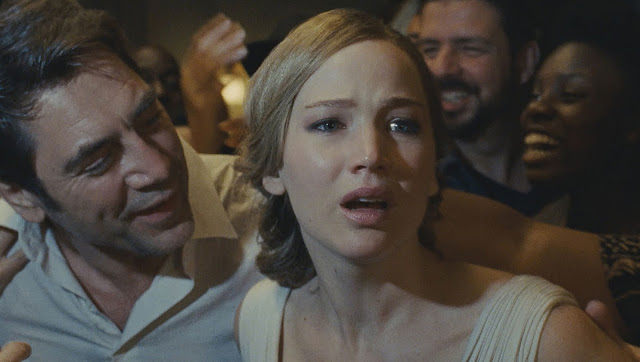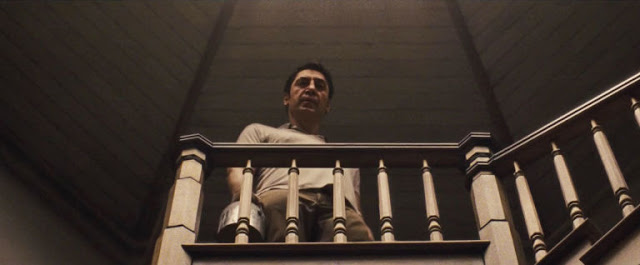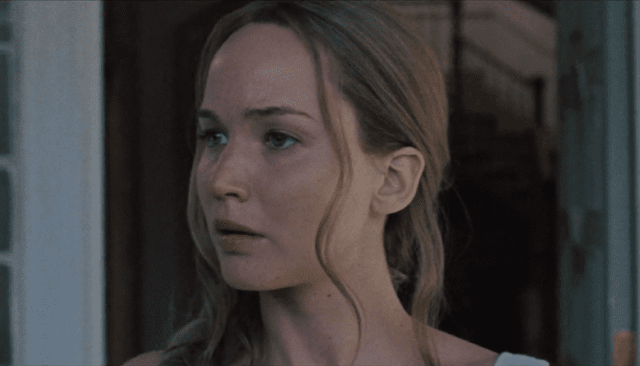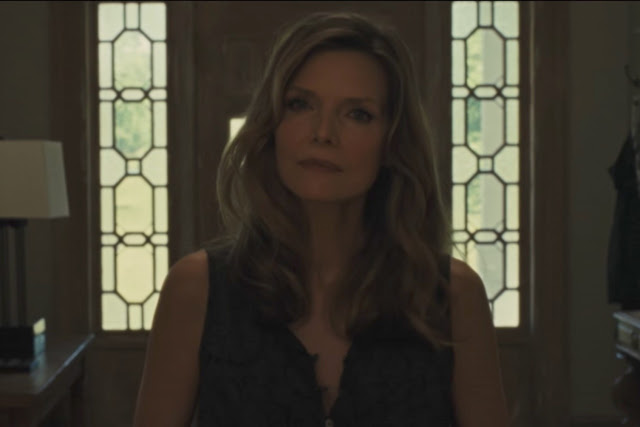The first shot in mother!, Darren Aronofsky’s head-spinning fever dream of a movie, is of a woman wreathed in flame, gazing impassively into the camera. It’s a bracing introduction, but it’s fairly mundane when judged against the standards of this film, which treats—or perhaps torments—viewers with all manner of twisted, hallucinatory imagery. Is this testament to mother!’s genius or its inanity? The answer, even more so than with most pictures, is likely to be a matter of individual taste. Yet Aronofsky’s commitment to his demented vision is so absolute, so uncompromising, that mother! is all but certain to elicit a response, whether it be delight or disgust. By the time the closing credits roll on this maddening, mesmerizing movie, you may not be entirely sure what you just saw, but you’ll know for sure that you saw something.
What you see most of the time—and this is a decidedly sound piece of filmmaking strategy—is Jennifer Lawrence. For all the otherworldly sights in mother!—the bleeding floorboards and breathing walls, the glistening crystals and charred flesh—none is quite as compelling as its lead actress’ face. The camera, operated by Aronofsky’s longtime cinematographer Matthew Libatique, spends roughly half the film studying Lawrence in intimate close-up, watching in quiet amazement as she creates a topography of human emotion. Her eyes widening and narrowing, her countenance rippling into expressions of anger, confusion, and dismay, Lawrence pulls you in, trapping you inside her character’s headspace, a surreal nightmare from which there’s no escape.
That nightmare eventually becomes literal. Yet for more than an hour, mother! operates not as an over-the-top fable, but as a spooky and enthralling haunted-house story. Its single location is a handsome manor house nestled in a bucolic meadow surrounded by verdant trees. The house’s sole occupants are a married couple, who are credited respectively as Mother (Lawrence) and Him (Javier Bardem). The husband is a world-renowned poet suffering from a crippling case of writer’s block; choosing to let him focus on his work, Mother spends her days renovating their home, repainting its faded walls and buttressing its fixtures. One fine day, their peaceful solitude is disrupted by a sharp knock on the door, announcing the arrival of a doctor (Ed Harris) seeking a place to stay. (“He thought we were a bed-and-breakfast,” Him chuckles, with a cheerful smile that the fretful Mother does not share.) It is far from the last time in the film that Mother will suffer the indignity of admitting uninvited guests.
Before long, Mother and Him are hosting not just the doctor but his wife (Michelle Pfeiffer, deliciously vampy), a frosty woman fond of strappy tops and searching looks. What begins as visitation seems to turn into occupancy, and once Mother learns that the doctor is an ardent fan of her husband’s work, she begins to wonder about the true intentions of her new lodgers.
She is not the only one asking questions. By design, mother! prods you into pondering its mysteries and doubting its reality. For example, just where is this house located? Where did the doctor come from, and what does he really want? Why is it that the characters seem to have no names? And what the hell is rattling around inside the walls?
It is during this extended stretch of anticipative dread that Aronofsky brings the full weight of his considerable skill to bear. The director has helmed a number of divisive movies—having previously declared Requiem for a Dream a masterpiece, I will also stick up for the underrated Noah but will fight anyone who likes The Fountain—but he has never made a boring one. And mother!, with its nervy construction and ominous atmosphere, seethes with intrigue and suspense. Scenes of ostensible ordinariness acquire a fantastical tint, whether it’s Mother repeatedly dumping a tendriled amber liquid into her water glass or smearing the walls with a sickly yellow-brown coat that looks like a swatch of death. The house’s surfaces also gain sinister and lifelike dimension; those horrible walls seem to be concealing some sort of bloated aquatic creature, while no matter how hard Mother scrubs, she can never cleanse certain floorboards of the stain of blood.
This sense of foreboding is not purely a matter of conceit; it is the product of deliberate craft. Visually, mother! is precise but not ostentatious, as Libatique’s roving handheld camera amplifies the feeling of creepy closeness without making you nauseous. The production and sound design are even more impressive. The house seems to have been jointly architected by Escher and Kafka; vertiginous stairways lead up and up and up (it feels as though the home has twenty different stories), while the basement pulsates with unknown menace. And every noise, every bump, is calibrated to scratch at your brain, drawing you ever deeper into the film’s fun-house horrors.
As immersive and meticulous as mother! is, it simply wouldn’t work without Lawrence’s hypnotic, aching performance. The risk in making something so completely bonkers—besides, you know, alienating your entire audience—is that the absurdity will overwhelm the humanity. But Lawrence, through both sweeping theatrics and smaller gestures—when Him enthuses of the doctor, “It’s so nice to talk to someone who understands my work,” the crestfallen look on her face is devastating—gives this movie its yearning, tortured soul. As mother! plunges into operatic madness and outsized allegory, she continues to imbue it with a glimmer of genuine emotion, a spark that outshines all of the metaphorical pyrotechnics exploding around her.
About which: I’ve refrained from recounting the details of mother!’s final act, partly because its lunacy is difficult to describe, partly because you wouldn’t believe me if I told you. Suffice it to say that, as more and more people arrive unannounced at the house, the film undergoes a radical transition, morphing from unsettling drama into garish parable. Its themes are surely subject to interpretation—the internet is already rife with theories, explanations, and complaints about theories and explanations—but to my rudimentary mind, the movie is a study of religion, both the bountiful joy it can bring and the troubling fervor it can instill. The masses descending on the estate are righteous followers of Him’s word, and as they grow increasingly maniacal, the film explores how pious devotion can warp into obsessive fanaticism.
Maybe my reading is wrong, though it hardly matters. The irony of mother! is that, as it grows more and more outré, it becomes less and less interesting. Aronofsky’s refusal to conform his cinematic vision to mainstream standards may be admirable, but it doesn’t mean he has anything noteworthy to say. Instead, he serves up an intentionally ridiculous climax that mistakes extremity for insight. Nor does Aronofsky’s self-awareness make his faux-provocative antics any less gauche, or tedious. By the time fires were being set and rebels were being shot and babies were being devoured (yes, really), I wasn’t so much dropping my jaw as rolling my eyes.
Yet while mother!’s third act is silly and excessive and diminishing, I still want people to see it. My reasoning for this is selfish: I want more movies like mother! to get made, even if I’m confident that nobody’s ever made a movie quite like it. (If you insist on finding a comparable, Rosemary’s Baby is an obvious choice, while more modern cultists may see a resemblance to the batshit finale of Perfume: The Story of a Murderer.) It may be obnoxious in parts, but as a whole, mother! is impossible to dismiss. (In that sense, it’s similar to another challenging 2017 release, A Ghost Story; combine the first hour of this with the last half-hour of that, and you might really have something.)
Indeed, mother! is less a work about religion than a work of religion. Acolytes will surely erect temples in its name, preaching its gospel of unwavering defiance and heedless ambition; opposing crusaders will seek to burn these shrines down, shrieking warnings of its insanity and vulgarity. (The divide has already begun: The film earned an “F” CinemaScore, an extraordinarily rare mark that some critics perceive to be a fiendish badge of honor.) I’d like to think I’m wise enough to locate a middle ground, appreciating the movie’s considerable strengths while struggling with its frustrating flaws.
But who am I to be superior? After all, when I stumbled out of mother! in a daze, my first instinct was that I needed to tell as many people as possible that I’d just witnessed yet another miraculous performance from Jennifer Lawrence. So forgive me as I continue to spread the word—it’s my sacred duty. Bardem may be playing God, but it’s his costar who’s divine.
Jeremy Beck is the editor-in-chief of MovieManifesto. He watches more movies and television than he probably should.





